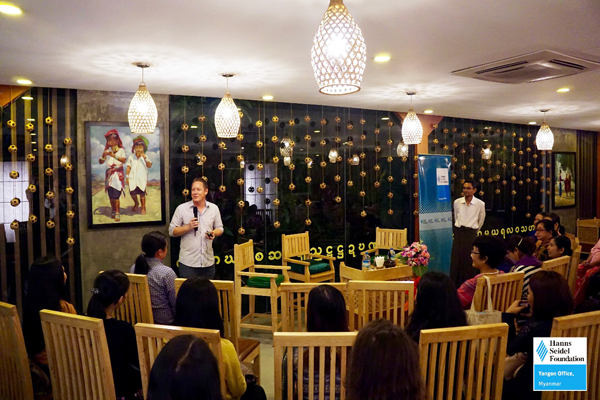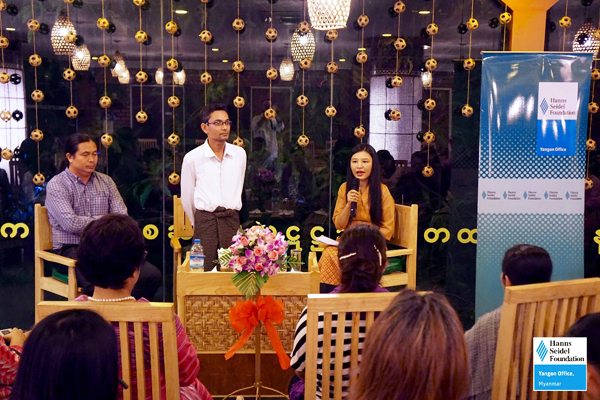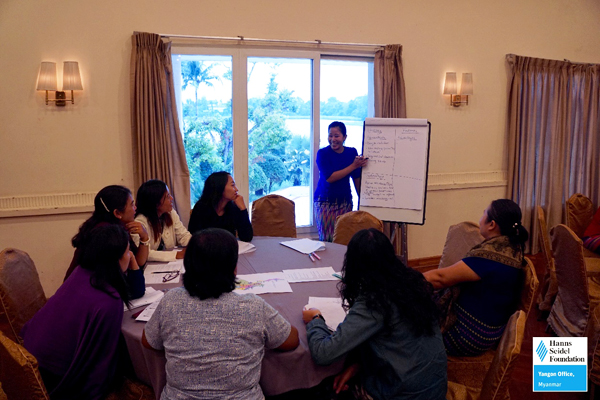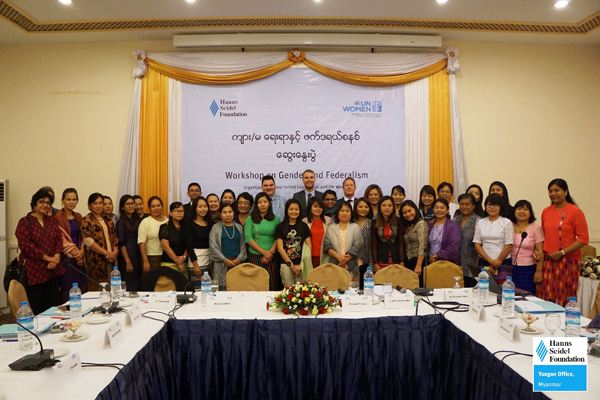Gender and Federalism Workshop

Achim Munz (Country Representative of Hanns Seidel Foundation Myanmar) opening a podium discussion.
HSF
Gender and Peace
In the opening remarks of the three-days workshop Jean D’Cunha (Head of UN Women Myanmar) said “The gender aspect plays a crucial role in the peace process. Only an all-inclusive peace process, that represents all groups in society can achieve sustainable peace”.
At present there is a lack of knowledge about gender aspects in Myanmar in general and about federalism, especially among women. This is also reflected in the representation of women in the peace process. For example, only 7 percent of the delegates of the Union Peace Conference’s (held in January 2016) were women.

Aung Soe Min (Programme Manager of Hanns Seidel Foundation) (middle) with the panelists Sai Kyaw Nyunt (Secretay of the Union Peace Dialogue Joint Committee) (left) and Daw Thuzar Thant (Manager at the Euro Burma Office) (right).
HSF
However, a higher share of women in the peace process is essential for many reasons. One is, that “peace matters to women” Dr. Rekha Oleschak-Pillai stated. Women are often strong advocates for peace since they are historically the ones responsible for health and education matters within families.
Federalism
Presently though, there is a lack of knowledge about federalism among women in Myanmar. Hence, the participants arrived from different states/ regions to learn about it and to close the knowledge gap. Many of the represented civil society organization. The acquired knowledge they can pass to colleagues and friends and use it in their professional lives.

Participants during a group work session.
HSF
Experts from the University of Fribourg (Swiss), Canterbury University (United Kingdom) and the University of New South Wales (Australia) held presentations on the topic of “gender” and “federalism” and how the two aspects relate to each other.
For instance, according to the experts, federalism brings better chances of local participation and democracy. This helps to protect minorities and serves as a peace making tool. Besides general information, the experts also provided Myanmar specific knowledge. Especially Dr. Soren Keil from Canterbury University answered many Myanmar related questions raised by the enthusiastic participants. In group work sessions the participants also applied the knowledge and put it into the Myanmar context.

A group picture of all participants and experts of the Gender and Federalism Workshop.
HSF
Additionally, a panel discussion in the evening of the second day dealt exclusively with Myanmar. Sai Kyaw Nyunt (Secretay of the Union Peace Dialogue Joint Committee) and Daw Thuzar Thant (Manager at the Euro Burma Office) explained their points of view and gave a good insight of the most recent events related to Gender and Federalism in Myanmar.
In a closing remark on the third day Achim Munz (Country Representative of the Hanns Seidel Foundation) said: “This successful workshop can be considered as a starting point of a series of workshops on the topic”.
